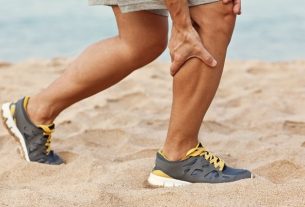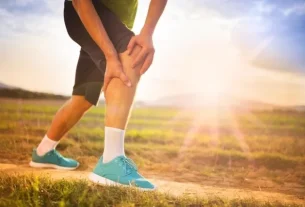The appearance of cramps during pregnancy is relatively common and affects almost half of pregnant women, and is normally associated with normal changes during pregnancy.
Although it is not a cause for concern, the appearance of cramps should always be reported to the obstetrician, especially if they are very recurrent, as it can also be a sign of decreased dehydration or changes in the values of some minerals, such as calcium and potassium, which can be replaced to alleviate discomfort.
In general, good ways to relieve cramps include: stretching the affected muscle, performing a massage and applying warm water compresses to the area. To prevent them from appearing too frequently, in addition to consulting your obstetrician, it is important to exercise regularly and maintain a balanced diet, rich in water, fruits, vegetables and seeds.
Below we indicate the most common causes of cramps during pregnancy and what to do in each case:
1. Excessive tiredness
This is the most common reason for cramps to appear during pregnancy and it happens because pregnancy is a phase of major changes in a woman’s body, which makes the pregnant woman feel more tired than usual. This fatigue can end up putting a lot of pressure on your muscles, especially those in your legs, leading to cramps.
What to do: Normally simple techniques such as stretching the muscles, massaging the affected area and applying warm compresses are enough to relieve the cramp.
2. Weight gain
Weight gain is one of the main reasons for the development of leg cramps, especially due to the baby’s growth, which ends up putting pressure on the nerves and blood vessels that pass from the abdomen to the legs.
It is for this reason that muscle cramps often only begin to appear after the third trimester, as this is when the baby is already larger, putting greater pressure on it.
What to do: Ideally, women should try to gain weight gradually and healthily. Furthermore, when your belly is already very big, it is also important to rest more during the day. Here are some nutrition tips during pregnancy to avoid gaining excess weight.
3. Circulation problems
During pregnancy, it is normal for blood circulation to be slower due to the effect of pregnancy hormones and the increase in blood volume in the body. For this reason, it is normal for blood to accumulate in greater quantities in the legs, creating swelling and facilitating the appearance of cramps.
What to do: A good way to avoid this type of cramps is to rest regularly throughout the day with your legs slightly elevated, above the level of your heart, so that blood circulation is easier. Check out other ways to combat fluid accumulation during pregnancy.
4. Dehydration
Adequate water levels are very important for the functioning of the entire body, including the baby’s development. For this reason, when a woman is not drinking enough water, the body may try to compensate by removing water from places where it is less important, to protect the pregnancy. One of the places that can be affected are the muscle fibers, which no longer function properly and cause cramps.
In addition to cramps, other signs that can help identify dehydration include a feeling of constant thirst, a decrease in the amount of urine and dark yellow urine.
What to do: During pregnancy it is recommended to drink between 6 and 8 glasses of water per day to avoid dehydration.
5. Lack of calcium or magnesium
Calcium and magnesium are two very important minerals for the functioning of muscle fibers and, therefore, when some are lower than ideal, complications may arise, such as cramps.
What to do: You should consult your obstetrician to do a blood test and confirm the levels of calcium and magnesium in your body. If they are altered, your doctor may prescribe the use of a supplement to restore the levels of these minerals.
6. Deep vein thrombosis
This is the most serious but also the rarest cause of cramps during pregnancy. However, pregnant women have a greater risk of forming clots that can end up clogging one of the vessels in the leg and result in deep vein thrombosis.
However, in addition to cramps, thrombosis is also accompanied by other signs that are easy to identify, such as severe and sudden pain, swelling of the leg, redness and dilation of the veins.
What to do: Whenever deep vein thrombosis is suspected, it is important to go to the hospital to confirm the diagnosis and begin the diagnosis. In some cases, thrombosis may end up resolving within a few minutes, relieving symptoms, but in any case it is always important that the pregnant woman is observed by a doctor. See 5 tips to avoid deep vein thrombosis.
How to prevent the cramp from recurring
Some tips that should be followed to prevent new episodes of cramps during pregnancy are:
- Do daily stretchesas it helps to provide flexibility and correct changes in posture;
- Practice light to moderate physical activitysuch as walking, for about 30 minutes a day, for 3 to 5 days a week, as they improve strength, elasticity and circulation in muscles
- Avoid excessive exerciseas intense and exhausting activities can also trigger fatigue and sudden muscle contractions;
- Drink about 1.5 to 2 liters per daykeeping the body hydrated;
- Eat a diet rich in calciumpotassium and magnesium, present in foods such as avocado, orange juice, banana, milk, broccoli, pumpkin seeds, almonds, hazelnuts or Brazil nuts, for example.
Although these foods are rich in minerals that help prevent cramps, it may be necessary to take supplements rich in these minerals, which should only be taken by pregnant women when recommended by a doctor.
Is having cramps during pregnancy dangerous?
Despite being very uncomfortable, most of the time, having cramps is not dangerous, and it is recommended to follow the tips we mentioned to alleviate and prevent these episodes.
However, if they appear frequently, it is advised to report it to the obstetrician during prenatal care, so that he can investigate the possible causes, through measurements of electrolytes and vitamins in the blood, and, if necessary, prescribe some medication for correction, such as magnesium. or vitamin supplements.

Sign up for our newsletter and stay up to date with exclusive news
that can transform your routine!
Warning: Undefined array key "title" in /home/storelat/public_html/wp-content/plugins/link-whisper-premium/templates/frontend/related-posts.php on line 12
Warning: Undefined array key "title_tag" in /home/storelat/public_html/wp-content/plugins/link-whisper-premium/templates/frontend/related-posts.php on line 13




